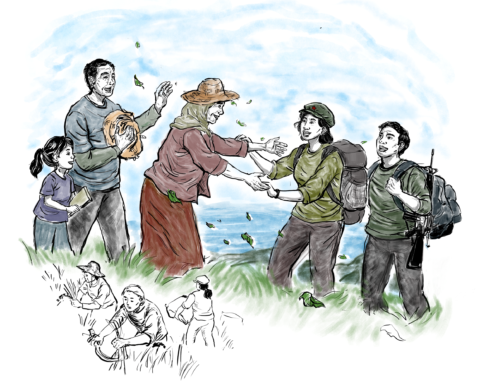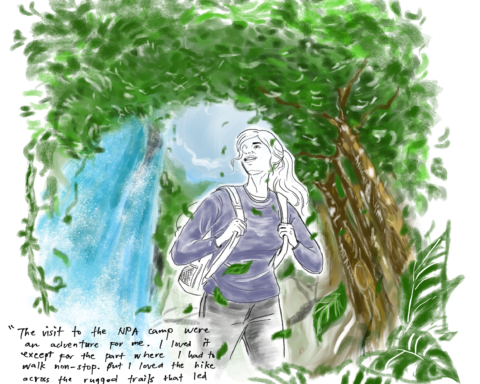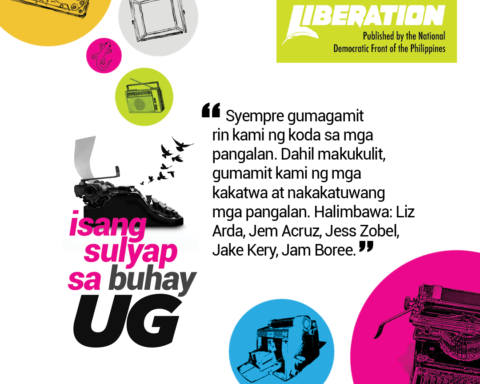The place many kasamas fondly call as “baryo” is still pitch dark, fast asleep and eerily silent. But the beautiful sight of colorful flowers springing out from the earth amid the chilly weather that envelop them signals a renewed hope. And there is joy of anticipation when the sun will start to peek at the horizon and unleash the riot of sounds and motion that will shatter the peace and quiet of the dark night of the flatlands many have learned—exiles, refugees, migrant workers, tourists, and sojourners alike—to be their second, permanent even, home.
And when dawn breaks, the arduous plodding of political work in the NDFP office in Barrio Utrecht in The Netherlands, thousands of miles away from the homeland, continues and is infectious and furious, even as the Three Wise Men of Peace—Manong, Fidel, and Joe—are resting in peace now. They who had survived torture and detention all but succumbed to sickness.
And yet the fondest of memories and the wisdom of their insights, the clarity of their counsel, and the lessons they have imparted over the years pervade this place where many a brainstorming, tacticizing, drafting, planning, tasking, and assessing took place, contradictions and struggle of ideas and unity in line and all. Their candid and iconic portraits in a hallowed corner a fitful reminder that they are still and will always be with us.
Yes, these Three Wise Men of Peace have different personalities and different strokes but they were essentially in cadence towards the goal of addressing the roots of the armed conflict via the parallel and complementary route of the peace process and negotiations with the enemy.
There is Manong, who amiably addresses us as “Bong” in his inimitable soft, gentle, and kind voice. Then already weakened by sickness but still sharp in mind, he would silently and intently listen to the internal discussions and occasionally interject his wise views and opinion at significant points, drawing from his rich experience as one of the negotiators during the peace talks in 1986.
Ever so disarmingly humble and soft-spoken and exhibiting the most affectionate concern for every kasama whoever she or he is, Manong continued to meticulously edit and copyread drafts of statements and proposed drafts of agreements even when he was at sick bay.
And there is Fidel, who continued to be called by and to call kasamas “Bok” in his hoarse and peculiar shrill voice. Ever so loud and audible all over the place, he was seen as the “operator” and “broker” of many a bilateral meeting or negotiation, both formal and informal, open or discreet. He would bring with him the marching orders, as it were, of the unified position of the NDFP negotiating team. He would himself take on the humongous task passed on to him by another wise man of peace: LJ or Ka Louie to most of us.
Fidel would be the “bad cop” who would cut down to size any arrogant or patronizing member on the other side of the negotiating table with his passionate articulation and candid remonstrations against the duplicity and unreasonableness of the other party’s audacious proposals, drafts, and responses during the peace negotiations.
A severely tortured and long-held political detainee himself, Fidel would at every juncture and opportunity fight for the freedom and justice for the political prisoners. And he can be thorough and meticulous.
And of course, there is our Joe, Joma, “lolo” or “tanda” to one and all—the guiding light, chief steward, and the problem solver. He came to be known even by the other side and the Third Party Facilitator as the “good cop” of the peace negotiations, with his unique nasal voice and boisterous laughter (when he is not intensely serious and caustic in his colorful language).
With his eloquence and masterful grasp of language, line, lyrics, and levity, he has practically steered the negotiations into its correct direction, successfully compelling the other party into producing and agreeing to seminal and landmark agreements and statements.
Quick and sharp in his analysis, prolific in drafting statements and tweaking proposed agreements, Joma speed reads and breezes through both short and voluminous documents. He marshalls the facts and draws from history and events with phenomenal memory when he supports and argues his superior ideas on various issues in the course of the peace negotiations.
Joma would doggedly hold on and ensure the revolutionary integrity of the movement, express the bilateral and reciprocal nature of the peace negotiations, remind one and all the bigger picture and unique value and significance of the peace negotiations in the overall struggle for liberation even with its inherent nature and built-in limitations.
Joe would be known and acknowledged even by the other side as “reasonable” and flexible in tactics yet firm in basic principles. He would initiate or push for advanced drafts of documents, write or give pointers to drafters and negotiators and vet with an eagle eye every word and punctuation mark in the paperchase of the negotiations.
These are our Three Wise Men of Peace. They are not physically in our midst anymore but their advise, counsel, guidance, work, example and inspiration would determine and define in large measure the course and conduct of any future negotiations to address the reasons why there is an ongoing armed conflict and why the people and comrades continue to take up arms, and carry the torch in waging a just war.
Rest in peace, our dearest Three Wise Men of Peace.
Even as we will not rest as we seek a just and lasting peace. (Joven Filimon) ###





